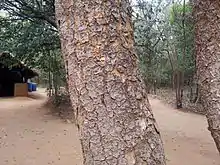| Chloroxylon swietenia | |
|---|---|
 | |
| Ragihalli Forest, Bengaluru district, India. | |
| Scientific classification | |
| Kingdom: | Plantae |
| Clade: | Tracheophytes |
| Clade: | Angiosperms |
| Clade: | Eudicots |
| Clade: | Rosids |
| Order: | Sapindales |
| Family: | Rutaceae |
| Genus: | Chloroxylon |
| Species: | C. swietenia |
| Binomial name | |
| Chloroxylon swietenia | |
| Synonyms[2] | |
| |
Chloroxylon swietenia , the Ceylon satinwood or East Indian satinwood,[3] is a tropical hardwood, the sole species in the genus Chloroxylon (from the Greek χλωρὸν ξύλον, "green wood"). It is native to southern India, Sri Lanka, and Madagascar.[1]
It and Zanthoxylum flavum, the West Indian satinwood, are considered to be the original satinwoods.[4]
Wood
Its wood is prized for veneers, inlays, fine furniture, and other specialty applications.[4]

At Pophum's Arbortum, Dambulla

Chloroxylon from India
_at_Kambalakonda_Eco_Park_in_Visakhapatnam.jpg.webp)
East Indian satinwood (Chloroxylon swietenia) at Visakhapatnam
Conservation
Populations have declined due to overexploitation.[1]
References
- 1 2 3 Asian Regional Workshop (Conservation & Sustainable Management of Trees, Viet Nam, August 1996). 1998. Chloroxylon swietenia. In: IUCN 2013. IUCN Red List of Threatened Species. Version 2013.1. Downloaded on 24 July 2013.
- 1 2 "Chloroxylon swietenia". Plants of the World Online. Royal Botanic Gardens, Kew. Retrieved 22 May 2019.
- ↑ "Chloroxylon swietenia". Ecocrop. Food and Agriculture Organization (FAO). Retrieved 22 May 2019.
- 1 2 "East Indian Satinwood | The Wood Database (Hardwood)". Retrieved 2023-03-04.
This article is issued from Wikipedia. The text is licensed under Creative Commons - Attribution - Sharealike. Additional terms may apply for the media files.
